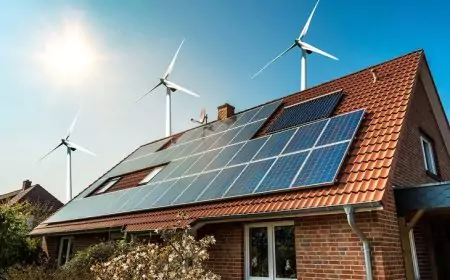Energy-Efficient Homes to Reduce Global Warming
Energy-efficient homes are not just homes that use electricity sparingly. Energy-efficient homes have quite a role in reducing the impact of global warming.

Energy-efficient homes are homes that use energy very effectively and efficiently. So that the use of energy sources on this Earth is not reduced in vain. In addition to lowering energy supplies quickly, the use of energy on Earth also has a negative impact.
The negative impact of energy use comes from emissions of fossil fuels. This fuel is still the mainstay and primary source of energy on Earth. The fossil fuels in question are oil, gas, and coal.
Energy Efficient Homes are Our Way to Contribute
An energy-efficient house can also be said to be a house that is not too dependent on fossil fuels. With the effective and efficient use of fossil fuels, energy-efficient homes are expected to be able to reduce global warming.
The reason this can happen is if fossil fuels are used wisely, effectively, and efficiently. Thus, carbon dioxide gas from burning fossil fuels will be significantly reduced. The causes of global warming can also be reduced.
If you have an energy-efficient home, it can be a way to contribute. Then how do you have an energy-efficient home? Here are some ways you can do to be able to have an energy-efficient home.
Energy-Efficient Homes with the Right Alternative Energy to be the Solution
It should be noted here that energy-efficient homes are not just saving electricity usage or switching from motorized vehicles fueled by oil or gas to electric vehicles.
The production of electricity also uses a lot of coal as fuel. The difference between fuel oil and gas is that there are currently more coal reserves on Earth. It is estimated that coal will last longer than oil and natural gas.
Therefore, currently, there are many campaigns to switch to using electric vehicles or electric energy. The goal is to reduce the use of oil and natural gas.
However, if we look closer, using electricity from coal-fired power plants is not the right solution. Of course, coal is also a limited resource. Alternative energy that is not from fossils is needed.
Appropriate and Applicable Alternative Energy for Energy-Efficient Homes
Energy-efficient homes can be redefined as homes that use alternative energy appropriately. So that dependence on fossil fuels can be reduced. Energy used at home is usually for cooking, lighting, space heating, water heating, and operating other electrical equipment.
Some alternative energies that can be applied to energy-efficient homes have been summarized by tafansa.id for you. Here is the list:
1. Biomass Fuel
Biomass fuel is solid, liquid, or gas produced by animals or plants, such as agricultural waste or livestock manure. This type of fuel is classified as renewable and is available continuously.
2. Biogas Fuel
Biogas fuel is an organic fuel in the form of gas. Biogas is produced by fermenting plants such as sugar cane and corn. It can also be sourced from the remains of other plants, animal waste, and human waste.
3. Solar Power Plant
Sunlight is very abundant and can be converted into electrical energy. Sunlight can be converted directly into electrical energy and also be stored first in a battery.
4. Wind Power Generation
Alternative electrical energy can also be obtained from wind turbines. This can be applied to places or areas with fairly strong winds throughout the year.
Energy-efficient homes that use alternative energy sources can reduce the global warming process and also save on the use of fossil fuels. The application of energy-efficient housing can be made individually, but it will have a much more impact if it involves large groups, for example, the local government or even the state government.
